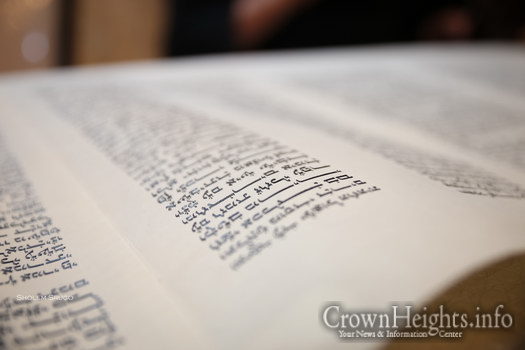
Weekly Story: Where We Stand
by Rabbi Sholom D. Avtzon
Being that this Shabbos, erev Rosh Chodesh Kislev, is the Yahrzeit of my father, Harav Meir a”h, and in addition to davening as the shliach tzibbur (cantor) I will have the maftir aliya, I chose to share with the readers of this column, something he told me concerning saying the maftir. I don’t know if this is a halachah (as I didn’t find it in sifrei halachah), or it is just the hergesh (feeling) of a Chossid, but to me it is the way a chossid guides his life. So while it is not a typical story, it is a thought to farbreng on; – and that is the purpose of this column.
An Introduction:
The Avudraham and Levush explain that the custom of saying some pesukim from the Neviim or Kesuvim on Shabbos began in the days when Antiyuchis (of Chanukah) ruled over Eretz Yisroel and (amongst his other evil actions), declared it illegal to read publically the weekly Torah Parsha. In order to remind the populace of what the parsha was speaking about, the sages instituted that we say passages of the prophets that discuss a similar theme to what we would have been reading in the Torah.
Being that this was instituted, it remained in effect even after the Jews were victorious and expelled the Greek army and were then able to read the weekly Torah portion again in public.[1] So then it became the haftara.
However, while the passages of the prophets are the words that Hashem told them, their holiness is not on the same level as the words of the Torah itself.
Based on this, my father told me; in order to differentiate between the two, we should not read the maftir in the same place that the Torah is read from. Rather, we should read it from the side of the Bimah. He continued, but you may ask, the Rebbe stands in the same place as the one that reads the Torah? The answer is, when the Rebbeim read it, it is as if they were saying that nevuah for the first time, since shechinah medaberes mitoich giroinum – the Shechina itself is speaking through their throats.
Authors note: This explains why in all communities the reading of the megillah on Purim is in the same place as the reading of the Torah, since the megillah is not being read in lieu of the Torah itself.
Since it is also the Shabbos of Kinus ha’shlucim, I would like to share a thought on the weekly parsha, which one of the readers of this column shared with me in honor of the shluchim. I am presenting it in their words. If you can forward to me some interesting stories for future weeks, I will greatly appreciate it. Thank you.
We know so little about Yitzchok and he is given much less space in the Torah in comparison to Avrohom or Yaakov (- Avrohom gets 3 parshiot: Lech Lecha, Vayeira, Chayei Sora; Yaakov gets a span of 6 parshiot: Vayetzeh all the way to Vayechi; while Yitzchok only gets Akeidas Yitzchok and Toldos and even that barely tells us much about him).
The little we know of Yitzchok stresses that he was a “true chossid” (dare I say “shaliach”) of Avrohom.
Whatever Avrohom did, he did, exactly like Avrohom.
He followed in his footsteps and conduct of his father/Rebbe.
Therefore he re-digs the exact same wells as Avrohom and gives them the exact same names. The Torah tells us this seemingly insignificant detail (who cares if it was new wells or restored wells from his father, and what does it matter their names?), because it shows that a chossid does what his Rebbe did.
When there is a famine, he goes to Avimelech – just as his father did.
He is told while in Gerar not to go to Egypt because he was planning to go there – just as Avrohom did.
Avrohom was spreading the name of Hashem: V’yikrah b’shaim Hashem, so did Yitzchok: Vayiven shom mizbeach vayikra b’shem Adoishem
He gives maasser – like his Father gave maaser to Malki Tzedek.
Even the blessings Hashem gives him, is in merit of his father/Rebbe: Eikeve asher shoma Avraham b’kolee vayishmor mitzvosai, chukosai, v’Torosai …Anochi Elokei Avraham Avicha al tira ki itcha anochi u’bairachticha v’hirbeisi es zaracha ba’avor Avraham avdee. – Because Avrohom listened in my voice and he kept My Commandments, decrees and teachings….I am the G-d of Avrohom, your father, do not fear, as I am with you, And I will bless you and multiply your descendants, because of my servant Avrohom.
He gets brochas because he is a chossid, and in merit of being a chossid to his Rebbe.
Yitzchok lived his life by always asking himself, “What would my father/Rebbe want me to do?”
That is Yitzchok, a true chossid.
May we all have tremendous hatzlacha in fulfilling our shlichus.
Rabbi Avtzon is a veteran mechanech and author of numerous books. He is available to farbreng in your community in honor of Yud Tes Kislev and can be reached at avtzonbooks@gmail.com.
***
[1] This is done in many circumstances, that once a custom began it remained in effect even after the reason no longer applied, Such as continuing to say atta choi’nantunoo in the Shemone Esreh on motzei Shabbos, even though we will say havdalah on a cup of wine.
However, in this case it was especially important to maintain the custom, since at that time the Kara’im were arguing that they only listen to the literal wording of the Torah and not the explanations of the sages and definitely not to the words of the prophets, so they continued saying in public passages of the prophets to demonstrate that they too are the words of Hashem.
















Good Vort
I enjoyed this chassidic vort contributed by a reader. As a shaliach I was inspired by this unique perspective of defining a chosid as one who walks in the footsteps of the Rebbe, staying the course without deviations.I pray to be zoche to be memaleh my shlichus k’fi rotzon ha’meshalai’ach, may we soon be led by him the Artzeinu Hakdosha, bba.
Agreed
Is this based on a sicha kodesh or kisvei Rabboseinu Nesiyaynu?
Deep
Thank you for sharing this deep thought on the parsha
Local crown heights
“May we all have tremendous hatzlacha in fulfilling our shlichus.”
We are all shluchim of the Rebbe. For some it’s their “official” job, they get tge recognution, but others are “under cover” shluchim, pretending to be baalei essek, not getting recognition, but always on call.
You are WRONG
There are Shluchim and there are fine Jews who try to do good things. DO NOT EQUATE THEM! A Shaliach is under the command of Merkas and is invited as a Shaliach to the Kinus. Fine Jews are not. DO NOT make them the same!
You don't get it
Moshol:
Mall security guard vs. NYPD, they are not “both” cops but one is “official” and the other is “under cover”!
Nimshal:
Shaliach is like NYPD – is a policeman, is a soldier, is an officer of the Rebbe’s Army. The baalei essek are like mall security guards,
Local C.H.
In your definition of a “shaliach” – only “card carrying” members qualify to this exclusive club.
Do you believe that the Rebbe would agree with you?
Maybe YOUR Rebbe would agree, but not MY Rebbe!
The Rambam says: Not only shevet Levi, but anyone who is inspired to dedicate himself in the service of Hashem…
Rabbi K of BMG
One reason people stand on the side is to avoid turning one’s back on the Sefer Torah – which is often being held by the one who did Hagbah directly behind the Bima, in such a way that if one stood at the center of the Bima, he would have his back direcly opposite teh Sefer Torah. By standing on the side of the Bima, this possible lack of Kavod for a Sefer Torah is avoided.
Part 2 that Yitzchok was a chosid, following path of avodah “just like Avrohom:, PLEASE! Yitzchok was Gevurah, established Mincha vs. Avrohom chessrd, established Shachris…
Sholom Avtzon
In general I don’t respond however, with said I will make an exception.
The Mitteler Rebbe was definitely a chossid of his father the Alter Rebbe and for that reason he wouldn’t ask or accept haskamos on his seforim.
He stated that it is not mine it is my father’s and my father doesn’t need a haskama.
Yet his style was totally different.
In Chassidus it is noted that the Avos all were a merkova as well as that they had a hiskalilis of all, just by Avrohom the hadgasha was chesed while by Yitzchok it was gevurah.
Concerning your first point I am well aware of that point but I am not writing it as a halacha guide because then you get into the question is a feet away considered a your back facing it and other considerations that are mentioned in seforim.
Further discussion can be directed directly to me.
Huh?
The Maftir, after his aliyah, stands on side to allow the Magbiah do the Hagbah. Once he is at the side of bima, he remains at the side to rad the Haftorah – since he isn’t “called up” again.
Huh?
This isn’t a “deep” halachic issue or an esoteric kabbalistic issue. It is quite simple and practical.
The Maftir, after his aliyah, stands on side to allow the Magbiah do the Hagbah.
Once he is at the side of bima, he remains where he is standing at the side to read the Haftorah (– since he isn’t “called up” again).
There is no need for pilpulim or chassidic insights on this topic.
Huh?
Also in response to Rabbi K of BMG “part 2”:
When Yitzchok established mincha, he was ADDING to Avrohom’s shachris, not replacing it! Likewise, his “gevora” was in ADDITION to avodas hachessed of Avrohom.
A chosid knows that he is not on the madreiga of the Rebbe and needs to do “extra” to achieve.
This is POSHUT!
Milhouse
Note: The Kara’im revere all 24 seforim of Torah Shebichsav, just like us. They only reject the Torah Sheb’al Peh, claiming that anything Moshe taught that wasn’t written down was lost over the generations.
But the Kara’im are not a continuation of the Tzedukim. The Tzedukim didn’t reject Torah Sheb’al Peh, they had their own traditions which they claimed were Misinai, but they rejected the authority of the Chachomim to determine the halocho, and certainly to institute new mitzvos and practices. They disappeared after the churban, and the Kara’im were a new group that arose centuries later. Kara’im are basically Protestant Jews.